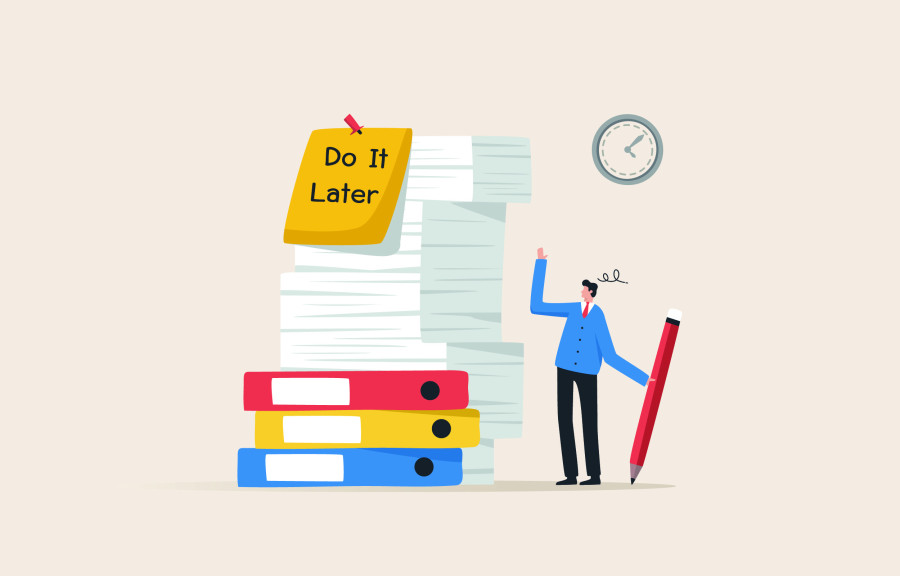Culture & Lifestyle
How not to put things off until the last minute
Occasional procrastination isn’t too bad. It only becomes an issue if your studies, work or life are directly affected.
Rukusha Giri
‘I will do it later’ can seem like an elementary sentence–something said as an afterthought. However, we can all relate to instances when the phrase has gotten us in trouble, be it assignments or work. Procrastination is the tendency of pushing things that one has to get done till the very last minute. Studies published by the American Psychological Association show that around 20 percent of adults procrastinate chronically. The number is as high as 50 percent among college students.
Most of us are guilty of leaving the preparation for a significant test until the last minute. We also wait until there are no clean clothes left to wear before doing the laundry. Despite multiple promises to go to the gym, we end up sleeping in.
Sandesh Dhakal, a lecturer at the central department of psychology at Tribhuvan University, says that procrastination is a relatively common phenomenon. However, chronic procrastination could hint at something a bit more serious, and those who feel like they are procrastinating too much should seek help. Dhakal talks about why the tendency of procrastinating has seen an increase over the few decades.
How can one realise that they are procrastinating?
Have you ever been busy with other activities instead of focusing on your primary task? This is the main sign that you are procrastinating. Let’s take an example of a student. When an exam is near, and you need to be studying, your mind suddenly recalls other minor activities. It could start by remembering that you have to clean your room, wash dishes, or do anything that isn't pressing for the moment.
Procrastinating occasionally isn’t all too bad. We all do it. However, it only becomes an issue if your studies, work or life become directly affected. Things get tricky when people don’t realise that they are not doing their primary task and are instead focusing on other activities.

Procrastination doesn’t always result in work not being completed. In fact, a procrastinator often finishes their work at the very last moment. But this effort often comes at a cost to their mental well-being. Moreover, the work often isn’t as sincere and lacks quality.
Is procrastination a symptom of mental health problems?
Procrastination is not a direct indication of a mental health condition. Instead, it could be seen as a symptom of mental health issues. When faced with an emotional disturbance or problem that an individual has a hard time coping with, they procrastinate to avoid dealing with it. Although it provides short-term relief, the guilt and pressure of unfinished work can be overwhelming.
Procrastination has been viewed as a defense mechanism. It offers an unhealthy protection from the harsh realities of life. Additionally, when people avoid essential tasks and focus on less important ones, it allows them to reassure themselves that they have some form of control in their lives. While it could hint at the possibility of anxiety, ADHD or other mental health issues, procrastination is not a direct symptom of a specific mental disorder.
Is procrastination more prevalent among young individuals?
Nowadays, young people are engaged in too many things. They consume a lot of information and have a lot of things on their minds. We often hear that kids shouldn’t be given too much pressure, but not giving kids any guidance can be harmful as well. As our brain develops the most as children, what we learn when young become our habits. Therefore, kids should be given proper guidance in matters of discipline, punctuality and sincerity without it being too harsh. If a child isn’t taught the value of doing things on their own and on time, then they could end up procrastinating as adults.
How can we stop ourselves from procrastinating?
People need to be aware first. Without realisation, we won’t know why and how we are procrastinating. Moreover, if it becomes chronic, we shouldn’t hesitate to tell others and seek help. In the case of adults, self-realisation and remedy work best, whereas in the case of children, it is the role of parents, teachers and community to teach children the importance of managing one’s time.




 9.12°C Kathmandu
9.12°C Kathmandu















